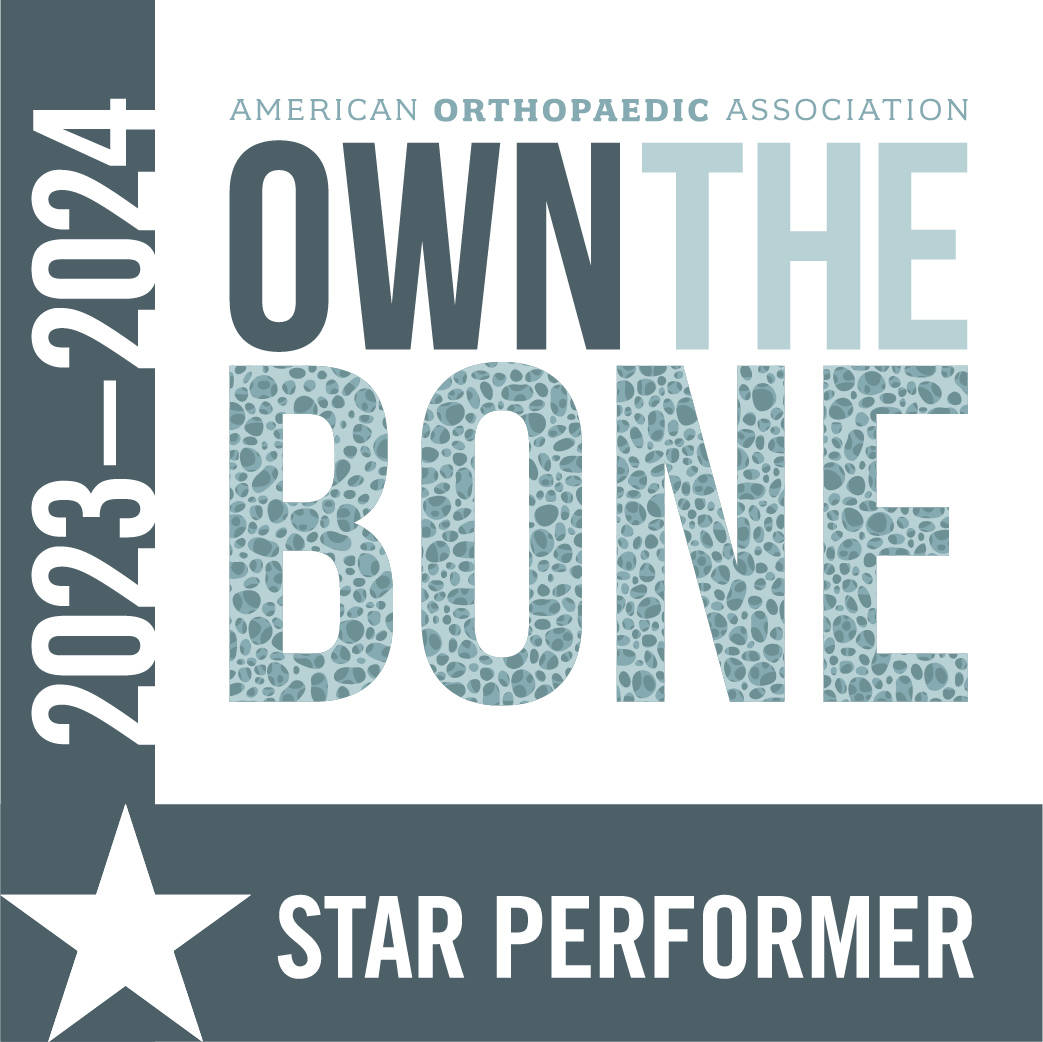Advancing Bone Health One Patient at a Time
UT Health Austin’s Musculoskeletal Institute receives national recognition for efforts to improve bone health awareness, care, and treatment for patients
Reviewed by: J. Mica Guzman, Jr., MD, MBA, DABFM, and Joanna Lopez, PA-C, MPH
Written by: Kaylee Fang

With every movement you make, your bones play a crucial role in providing the support necessary to maintain an active lifestyle. Maintaining your bone health can help prevent a variety of health conditions, including stress fractures, fragility fractures, osteoporosis, and other forms of bone loss that may occur as you age.
Your bone health is dependent on multiple factors. If you have experienced a stress fracture or a fragility fracture, have a history of osteoporosis, are following a diet that may be affecting your bone health, are taking steroids long-term, or are taking other medications that can affect your bone health, you may benefit from seeing specialists who can help you regain and maintain your bone health.
If you have healthy bones, fragility fractures should not occur. However, up to one-fourth of all men and nearly half of all women will suffer from at least one fragility fracture in their lifetime. Once you have suffered from one fragility fracture, your risk of suffering an additional fragility fracture increases by 2-4 times. UT Health Austin’s Musculoskeletal Institute offers patients comprehensive care and personalized treatment plans that address bone health conditions and concerns.
View or print our downloadable Bone Health flyer.
<br>Own the Bone
Despite more than 2 million adults in the United States experiencing fragility fractures each year, there are prevention measures available to help minimize this risk. The Musculoskeletal Institute participates in the American Orthopedic Association’s Own the Bone program, a national initiative designed to address the prevalence of fragility fractures caused by osteoporosis. This program provides tools and an online registry to enable hospitals, medical centers, and clinical practices to identify, evaluate, and coordinate the bone health management of fragility fractures and patients at risk of complications of orthopedic surgery.
“Any patient that is experiencing a fragility fracture due to osteoporosis qualifies for participation in this program,” explains Joanna Lopez, PA-C, MPH, a licensed physician assistant in the Musculoskeletal Institute. “The purpose of participating in this program is to identify the occurrence of fragility fractures, offer educational resources to affected patients, and provide comprehensive follow-up care.”
View or print our downloadable Preventing Future Fractures flyer.
<br>Prevention Measures
The Musculoskeletal Institute’s treatment plans align with Own the Bone’s 10 prevention measures and are designed with the intention of enabling you to perform the activities you enjoy as well as reduce your risk of bone injuries or developing other conditions related to bone health.
Personalized treatment plans include:
- A comprehensive review of your medical history, including diet, prescribed medications, supplement usage, and any daily activity/exercise engagement
- Imaging that assesses bone mineral density
- Patient education related to the effects of physical activity, diet, and lifestyle on bone mass
- Performance lab testing
- Prevention services that help reduce the risk of secondary fragility fracture
- Ongoing monitoring and care
“As part of the program, patients are screened and treated after their visit to prevent further fragility fractures,” notes J. Mica Guzman, MD, MS, DABFM, RMSK, CAQSM, a board-certified sports medicine specialist and the Primary Care Sports Medicine Clinical Director for the Sports and Injury Clinic within UT Health Austin’s Musculoskeletal Institute. He also serves as the Clinical Director for both Bone Health and Concussion Care within the Musculoskeletal Institute and the Medical Director of Sports Medicine and Events Coverage for the Musculoskeletal Institute. “This program helps orthopedic physicians provide ongoing care for patients, addressing an unmet need in post-fracture management.”
Learn more about the Musculoskeletal Institute’s participation in the American Orthopaedic Association’s Own the Bone program.
<br>Recognition as a Star Performer

The Musculoskeletal Institute was awarded the Own the Bone Star Performer recognition for both 2022-2023 and 2023-2024 by the American Orthopedic Association. A Star Performer is any participating institution that achieves a 75% compliance rate or higher on at least 5 of the 10 Own the Bone education and counseling prevention measures.
The Musculoskeletal Institute surpassed the 75% compliance rate on all 10 prevention measures, which include:
- Calcium supplementation (100%)
- Vitamin D supplementation (100%)
- Exercise, particularly weight-bearing and muscle strengthening (100%)
- Fall prevention education (100%)
- Smoking cessation (100%)
- Limiting excessive alcohol intake (100%)
- Follow-up notes and education materials provided to patient (100%)
- DXA to test bone mineral density (92%)
- Pharmacology for the treatment of osteoporosis (87%)
- Physician referral letter (80%)
“With our recognition as a Star Performer for 2 consecutive years, we continue to include more patients than the maximum limit for participation,” shares Dr. Guzman. “Our goal is to deliver quality care that addresses each individual’s needs.”
Learn more about taking ownership of your skeletal health.
<br>Advancing Bone Health Care
The Musculoskeletal Institute care team is made up of orthopedic surgeons, sports medicine physicians, physician assistants, physiatrists, physical therapists, chiropractors, nurse practitioners, dietitians, health social workers, and more, who work together alongside endocrinologists and rheumatologists to provide a multidisciplinary, individualized approach to caring for your bone health.
“Our care team builds strong connections with patients to support them in their journey toward improved bone health,” assures Dr. Guzman. “These discussions cover areas such as nutrition, physical activity, and lifestyle adjustments. If there are no findings or concerns related to fragility fracture or secondary contributors to osteoporosis during the patient’s screening process, we will then initiate discussions about alternative measures.”
The Own the Bone initiative also helps facilitate effective communication between the patient and their provider by increasing awareness and providing education to prevent fragility fractures. “Our care team actively shares resources and information in an effort to prevent fractures for everyone,” says Lopez. “We offer a range of resources for bone health education, all conveniently accessible in one place, simplifying the process for patients to access essential support.”
“Our passion lies in musculoskeletal and bone health, and we recognize that osteoporosis often remains unknown until you undergo screening or a fragility fracture occurs,” adds Dr. Guzman. “Fortunately, we have the means to help prevent these fragility fractures and improve your quality of life.”
For more information or to request an appointment with the Musculoskeletal Institute, call 1-833-UT-CARES (1-833-882-2737) or visit here.